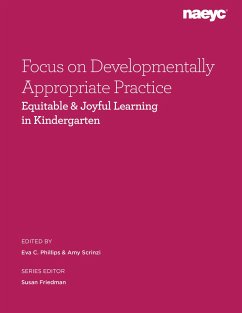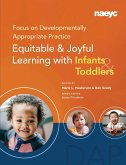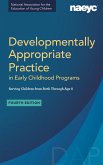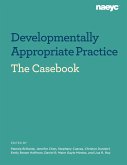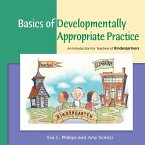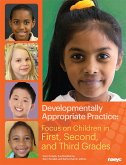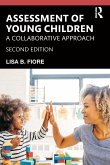Focus on Developmentally Appropriate Practice
Equitable and Joyful Learning in Kindergarten
Herausgeber: Scrinzi, Amy; Friedman, Susan; Phillips, Eva C.
Focus on Developmentally Appropriate Practice
Equitable and Joyful Learning in Kindergarten
Herausgeber: Scrinzi, Amy; Friedman, Susan; Phillips, Eva C.
- Broschiertes Buch
- Merkliste
- Auf die Merkliste
- Bewerten Bewerten
- Teilen
- Produkt teilen
- Produkterinnerung
- Produkterinnerung
If you've ever wondered how effective teachers actually do DAP in kindergarten, this is the book for you. You will see how kindergarten educators provide integrated learning opportunities that you can adapt to create a robust learning environment that is play oriented and supportive of required mandates and expectations. You'll read about educators making intentional decisions in key areas of practice, which form the six guidelines for DAP in action:Building a strengths-based community where everyone is welcomed and supported to grow and learnFacilitating reciprocal partnerships with…mehr
Andere Kunden interessierten sich auch für
![Focus on Developmentally Appropriate Practice Focus on Developmentally Appropriate Practice]() Focus on Developmentally Appropriate Practice33,99 €
Focus on Developmentally Appropriate Practice33,99 €![Developmentally Appropriate Practice in Early Childhood Programs Serving Children from Birth Through Age 8, Fourth Edition (Fully Revised and Updated) Developmentally Appropriate Practice in Early Childhood Programs Serving Children from Birth Through Age 8, Fourth Edition (Fully Revised and Updated)]() NaeycDevelopmentally Appropriate Practice in Early Childhood Programs Serving Children from Birth Through Age 8, Fourth Edition (Fully Revised and Updated)76,99 €
NaeycDevelopmentally Appropriate Practice in Early Childhood Programs Serving Children from Birth Through Age 8, Fourth Edition (Fully Revised and Updated)76,99 €![Casebook: Developmentally Appropriate Practice in Early Childhood Programs Serving Children from Birth Through Age 8 Casebook: Developmentally Appropriate Practice in Early Childhood Programs Serving Children from Birth Through Age 8]() Casebook: Developmentally Appropriate Practice in Early Childhood Programs Serving Children from Birth Through Age 841,99 €
Casebook: Developmentally Appropriate Practice in Early Childhood Programs Serving Children from Birth Through Age 841,99 €![Basics of Developmentally Appropriate Practice Basics of Developmentally Appropriate Practice]() Eva C. PhillipsBasics of Developmentally Appropriate Practice25,99 €
Eva C. PhillipsBasics of Developmentally Appropriate Practice25,99 €![Developmentally Appropriate Practice Developmentally Appropriate Practice]() Sue BredekampDevelopmentally Appropriate Practice53,99 €
Sue BredekampDevelopmentally Appropriate Practice53,99 €![Assessment of Young Children Assessment of Young Children]() Lisa B. Fiore (USA Lesley University)Assessment of Young Children64,99 €
Lisa B. Fiore (USA Lesley University)Assessment of Young Children64,99 €![Exemplars of Curriculum Theory Exemplars of Curriculum Theory]() Arthur K. EllisExemplars of Curriculum Theory27,99 €
Arthur K. EllisExemplars of Curriculum Theory27,99 €-
-
-
If you've ever wondered how effective teachers actually do DAP in kindergarten, this is the book for you. You will see how kindergarten educators provide integrated learning opportunities that you can adapt to create a robust learning environment that is play oriented and supportive of required mandates and expectations. You'll read about educators making intentional decisions in key areas of practice, which form the six guidelines for DAP in action:Building a strengths-based community where everyone is welcomed and supported to grow and learnFacilitating reciprocal partnerships with familiesObserving, assessing, and documenting children's learning and developmentUsing teaching strategies that enhance learning for each childImplementing curriculum tied to meaningful learning goalsDemonstrating professionalismThis book will inspire you to apply these guidelines to establish goals and create learning experiences that fit who and where your students are and advocate for practices and environments that facilitate equitable, joyful learning for all kindergartners.
Hinweis: Dieser Artikel kann nur an eine deutsche Lieferadresse ausgeliefert werden.
Hinweis: Dieser Artikel kann nur an eine deutsche Lieferadresse ausgeliefert werden.
Produktdetails
- Produktdetails
- Focus on Developmentally Appropriate Practice: Equitable and Joyful Learning
- Verlag: National Association for the Education of Young Children
- Seitenzahl: 176
- Erscheinungstermin: 16. Januar 2025
- Englisch
- Abmessung: 213mm x 275mm x 11mm
- Gewicht: 498g
- ISBN-13: 9781952331343
- ISBN-10: 195233134X
- Artikelnr.: 68469175
- Herstellerkennzeichnung
- Libri GmbH
- Europaallee 1
- 36244 Bad Hersfeld
- gpsr@libri.de
- Focus on Developmentally Appropriate Practice: Equitable and Joyful Learning
- Verlag: National Association for the Education of Young Children
- Seitenzahl: 176
- Erscheinungstermin: 16. Januar 2025
- Englisch
- Abmessung: 213mm x 275mm x 11mm
- Gewicht: 498g
- ISBN-13: 9781952331343
- ISBN-10: 195233134X
- Artikelnr.: 68469175
- Herstellerkennzeichnung
- Libri GmbH
- Europaallee 1
- 36244 Bad Hersfeld
- gpsr@libri.de
Volume editors Eva C. Phillips, EdD, is dedicated to teaching and advocating for young children and early childhood educators. Throughout her almost 40 years of service to North Carolina, she served as a kindergarten teacher, a state‑level Title I preschool and kindergarten consultant, an assistant professor and Birth‑Kindergarten Education Program Coordinator, and a district‑level program manager for early learning. She has collaborated on numerous projects supporting developmentally appropriate practices and was cocreator and cofacilitator of North Carolina’s Power of K Teacher Leader Initiative while at the North Carolina Department of Public Instruction. Dr. Phillips also served as president of the North Carolina Association for the Education of Young Children from 2009 to 2013. After retiring from the state in 2017, she began a consulting business to support early learning educators through professional development, consulting, and coaching. She is coauthor of the book Basics of Developmentally Appropriate Practice: An Introduction for Teachers of Kindergartners and the white paper Children Come First: Ensuring School Policies, Practices, and Strategies Lead to Positive 3rd Grade Outcomes. She is dedicated to working with educators in their pursuits to provide the most authentic, appropriate, engaging, and challenging experiences for all young children. Amy Scrinzi,EdD, is an accomplished educator with extensive experience in the field of education spanning more than 30 years. She is an assistant professor of child development at Meredith College in North Carolina. In addition, she serves as the coordinator of the birth‑to‑kindergarten licensure program, overseeing and guiding aspiring educators in their journey to become licensed educators. Dr. Scrinzi is a former classroom teacher of pre‑K through third grade, having taught in several public school districts in North Carolina. She later worked at the state’s Department of Public Instruction as a state‑level early childhood education consultant, developing and facilitating projects that included coleading the state’s Power of K three‑year kindergarten teacher leadership initiative. She also served as a state‑level K–2 math consultant, state lead for the North Carolina Kindergarten Entry Assessment (KEA), and state‑level mentor for nonpublic pre‑K teachers seeking a birth‑to‑kindergarten teaching license. She is coauthor of the bookBasics of Developmentally Appropriate Practice: An Introduction for Teachers of Kindergartners. Her experience as a classroom teacher, consultant, mentor, and author has equipped her with a comprehensive understanding of early childhood education, and she remains dedicated to supporting teachers’ use of effective practices that align with the developmental needs of young learners. Series editor Susan Friedman is senior director of publishing and content development at NAEYC. In this role, she leads the content development work of NAEYC’s books and periodicals teams. Ms. Friedman is coeditor of Each and Every Child: Teaching Preschool with an Equity Lens. She has extensive prior experience creating content on play, developmentally appropriate uses of media, and other topics for educators and families. She has presented at numerous educational conferences, including NAEYC’s Professional Learning Institute and Annual Conference, the South by Southwest Education (SXSW EDU) Conference & Festival, and the School Superintendents Association’s Early Learning Cohort. She began her career as a preschool teacher at City and Country School in New York City. She holds degrees from Vassar College and the Harvard Graduate School of Education.
1. About the Editors
2. Focus on Developmentally Appropriate Practice: Equitable and Joyful
Learning Book Series
3. Developmentally Appropriate Practice: An Introduction
4. Developmentally Appropriate Practice in Kindergarten
5. Part 1: Creating a Caring, Equitable Community of Learners
6. Chapter 1: Successful Transitions to and out of Kindergarten: Supporting
Children and Families Eva Phillips and Amy Scrinzi
7. Chapter 2: Routines, Rituals, and Mantras for Building a Joyful Classroom
in Kindergarten: Reflections from Our Small Mountain Community Classrooms
Lee Messer and Marylee Sease
8. Chapter 3: Supporting SelfRegulation and Autonomy in Kindergarten: One
Teacher’s Journey Amy D. Blessing
9. Chapter 4: How Do I See Myself? How Do Others See Me? Exploring Identity in
Kindergarten Doriet Berkowitz
10. Chapter 5: Becoming Upended: Teaching and Learning About Race and Racism
with Young Children and Their Families Kirsten Cole and Diandra Verwayne
11. Part 2: Engaging in Reciprocal Partnerships with Families and Fostering
Community Connections;
* Chapter 6: Developing Culturally Responsive Family Partnerships in
Kindergarten: Communicating About the Value of Play and Honoring
Families’ Funds of Knowledge Iris Chin Ponte and Yvonne LiuConstant
12. Chapter 7: Family Math Stories: Math for CrossCultural Connections and
Community Hannah Kye
* Chapter 8: Exploring Families’ Language Practices Through a Social
Studies Inquiry in Kindergarten Ivana Espinet, Maite T. Sánchez,
Sabrina Poms, and Elizabeth Menendez
* Chapter 9: Being the Bridge: Supporting the Families of
Kindergartners Whose Primary Language Is Not English Laura C.
RodríguezPérez
* Part 3: Observing, Documenting, and Assessing Children’s Development
and Learning
* Chapter 10: Authentic Assessment and Playful Learning: Purposeful
Assessment of Children’s Understanding Kimberly T. Nesbitt, Elias
Blinkoff, and Kathy HirshPasek
* >
* Chapter 12: Assessment in Kindergarten: Meeting Children Where They
Are Amy D. Blessing
* Chapter 13: Assessing Young Children in the Inclusive Classroom:
Using Data to Create Equitable and Joyful Learning Experiences for
All Christan Coogle and Heather Walter
* Chapter 14: Adding Play and HandsOn Learning into the Kindergarten
Classroom: Balancing Mandated Curricula and Assessments with
Developmentally Appropriate Practice Kacey Edgington and Amy
Prosser
* Part 4: Teaching to Enhance Each Child’s Development and Learning
* Chapter 15: Centers in Kindergarten: When Do You Have Time for That?
Juliana Harris
* Chapter 16: The Fine Art of Scaffolding Kindergarten Learners Elena
Bodrova, Barbara WilderSmith, and Deborah Leong
* Chapter 17: Joyful Learning Through Science Inquiry Projects: Snails
and Letter Learning Melissa Fine;
* Chapter 18: “There’s a Story in My Picture!” Connecting Art,
Literacy, and Drama Through Storytelling Bonnie Ripstein
* Chapter 19: Teaching Writing with Mentor Texts in Kindergarten
Katie Schrodt, Erin FitzPatrick, Bonnie A. Barksdale, Brandi Nunnery,
and Michelle Medlin Hasty
* Chapter 20: The Healing Power of Play Laura J. Colker and Sarah
Erdman
* Part 5: Planning and Implementing an Engaging Curriculum to Achieve
Meaningful Goals
* Chapter 21: Engaging and Enriching: The Key to Developmentally
Appropriate Academic Rigor Shannon RileyAyers and Alexandra
FiguerasDaniel
* Chapter 22: Incorporating PlayBased Learning into the Kindergarten
Classroom Margi Bhansali, Alli Bizon, and Erean Mei
* Chapter 23: Finding Joy in Kindergarten Mathematics Lauren Solarski
* Chapter 24: Joyful and Equity in Literacy: The Intersection of Access
and Opportunity Ryan LeeJames and Stacey Wallen
* Chapter 25: Adapting the Curriculum to Incorporate Student Inquiry
Through Teachable Moments Sabrina Burroughs
* Part 6: Demonstrating Professionalism as an Early Childhood Educator
* Chapter 26: Portraits of Teacher Leadership Jessica Jackson,
Samantha Mehrlich, Yolanda A. Sawyer, and Susan Choplin
* Chapter 27: Agency and Power in Young Children’s Lives: Five Ways to
Advocate for Social Justice as an Early Childhood Educator Jennifer
Keys Adair and Shubhi Sachdeva
* Index
2. Focus on Developmentally Appropriate Practice: Equitable and Joyful
Learning Book Series
3. Developmentally Appropriate Practice: An Introduction
4. Developmentally Appropriate Practice in Kindergarten
5. Part 1: Creating a Caring, Equitable Community of Learners
6. Chapter 1: Successful Transitions to and out of Kindergarten: Supporting
Children and Families Eva Phillips and Amy Scrinzi
7. Chapter 2: Routines, Rituals, and Mantras for Building a Joyful Classroom
in Kindergarten: Reflections from Our Small Mountain Community Classrooms
Lee Messer and Marylee Sease
8. Chapter 3: Supporting SelfRegulation and Autonomy in Kindergarten: One
Teacher’s Journey Amy D. Blessing
9. Chapter 4: How Do I See Myself? How Do Others See Me? Exploring Identity in
Kindergarten Doriet Berkowitz
10. Chapter 5: Becoming Upended: Teaching and Learning About Race and Racism
with Young Children and Their Families Kirsten Cole and Diandra Verwayne
11. Part 2: Engaging in Reciprocal Partnerships with Families and Fostering
Community Connections;
* Chapter 6: Developing Culturally Responsive Family Partnerships in
Kindergarten: Communicating About the Value of Play and Honoring
Families’ Funds of Knowledge Iris Chin Ponte and Yvonne LiuConstant
12. Chapter 7: Family Math Stories: Math for CrossCultural Connections and
Community Hannah Kye
* Chapter 8: Exploring Families’ Language Practices Through a Social
Studies Inquiry in Kindergarten Ivana Espinet, Maite T. Sánchez,
Sabrina Poms, and Elizabeth Menendez
* Chapter 9: Being the Bridge: Supporting the Families of
Kindergartners Whose Primary Language Is Not English Laura C.
RodríguezPérez
* Part 3: Observing, Documenting, and Assessing Children’s Development
and Learning
* Chapter 10: Authentic Assessment and Playful Learning: Purposeful
Assessment of Children’s Understanding Kimberly T. Nesbitt, Elias
Blinkoff, and Kathy HirshPasek
* >
* Chapter 12: Assessment in Kindergarten: Meeting Children Where They
Are Amy D. Blessing
* Chapter 13: Assessing Young Children in the Inclusive Classroom:
Using Data to Create Equitable and Joyful Learning Experiences for
All Christan Coogle and Heather Walter
* Chapter 14: Adding Play and HandsOn Learning into the Kindergarten
Classroom: Balancing Mandated Curricula and Assessments with
Developmentally Appropriate Practice Kacey Edgington and Amy
Prosser
* Part 4: Teaching to Enhance Each Child’s Development and Learning
* Chapter 15: Centers in Kindergarten: When Do You Have Time for That?
Juliana Harris
* Chapter 16: The Fine Art of Scaffolding Kindergarten Learners Elena
Bodrova, Barbara WilderSmith, and Deborah Leong
* Chapter 17: Joyful Learning Through Science Inquiry Projects: Snails
and Letter Learning Melissa Fine;
* Chapter 18: “There’s a Story in My Picture!” Connecting Art,
Literacy, and Drama Through Storytelling Bonnie Ripstein
* Chapter 19: Teaching Writing with Mentor Texts in Kindergarten
Katie Schrodt, Erin FitzPatrick, Bonnie A. Barksdale, Brandi Nunnery,
and Michelle Medlin Hasty
* Chapter 20: The Healing Power of Play Laura J. Colker and Sarah
Erdman
* Part 5: Planning and Implementing an Engaging Curriculum to Achieve
Meaningful Goals
* Chapter 21: Engaging and Enriching: The Key to Developmentally
Appropriate Academic Rigor Shannon RileyAyers and Alexandra
FiguerasDaniel
* Chapter 22: Incorporating PlayBased Learning into the Kindergarten
Classroom Margi Bhansali, Alli Bizon, and Erean Mei
* Chapter 23: Finding Joy in Kindergarten Mathematics Lauren Solarski
* Chapter 24: Joyful and Equity in Literacy: The Intersection of Access
and Opportunity Ryan LeeJames and Stacey Wallen
* Chapter 25: Adapting the Curriculum to Incorporate Student Inquiry
Through Teachable Moments Sabrina Burroughs
* Part 6: Demonstrating Professionalism as an Early Childhood Educator
* Chapter 26: Portraits of Teacher Leadership Jessica Jackson,
Samantha Mehrlich, Yolanda A. Sawyer, and Susan Choplin
* Chapter 27: Agency and Power in Young Children’s Lives: Five Ways to
Advocate for Social Justice as an Early Childhood Educator Jennifer
Keys Adair and Shubhi Sachdeva
* Index
1. About the Editors
2. Focus on Developmentally Appropriate Practice: Equitable and Joyful
Learning Book Series
3. Developmentally Appropriate Practice: An Introduction
4. Developmentally Appropriate Practice in Kindergarten
5. Part 1: Creating a Caring, Equitable Community of Learners
6. Chapter 1: Successful Transitions to and out of Kindergarten: Supporting
Children and Families Eva Phillips and Amy Scrinzi
7. Chapter 2: Routines, Rituals, and Mantras for Building a Joyful Classroom
in Kindergarten: Reflections from Our Small Mountain Community Classrooms
Lee Messer and Marylee Sease
8. Chapter 3: Supporting SelfRegulation and Autonomy in Kindergarten: One
Teacher’s Journey Amy D. Blessing
9. Chapter 4: How Do I See Myself? How Do Others See Me? Exploring Identity in
Kindergarten Doriet Berkowitz
10. Chapter 5: Becoming Upended: Teaching and Learning About Race and Racism
with Young Children and Their Families Kirsten Cole and Diandra Verwayne
11. Part 2: Engaging in Reciprocal Partnerships with Families and Fostering
Community Connections;
* Chapter 6: Developing Culturally Responsive Family Partnerships in
Kindergarten: Communicating About the Value of Play and Honoring
Families’ Funds of Knowledge Iris Chin Ponte and Yvonne LiuConstant
12. Chapter 7: Family Math Stories: Math for CrossCultural Connections and
Community Hannah Kye
* Chapter 8: Exploring Families’ Language Practices Through a Social
Studies Inquiry in Kindergarten Ivana Espinet, Maite T. Sánchez,
Sabrina Poms, and Elizabeth Menendez
* Chapter 9: Being the Bridge: Supporting the Families of
Kindergartners Whose Primary Language Is Not English Laura C.
RodríguezPérez
* Part 3: Observing, Documenting, and Assessing Children’s Development
and Learning
* Chapter 10: Authentic Assessment and Playful Learning: Purposeful
Assessment of Children’s Understanding Kimberly T. Nesbitt, Elias
Blinkoff, and Kathy HirshPasek
* >
* Chapter 12: Assessment in Kindergarten: Meeting Children Where They
Are Amy D. Blessing
* Chapter 13: Assessing Young Children in the Inclusive Classroom:
Using Data to Create Equitable and Joyful Learning Experiences for
All Christan Coogle and Heather Walter
* Chapter 14: Adding Play and HandsOn Learning into the Kindergarten
Classroom: Balancing Mandated Curricula and Assessments with
Developmentally Appropriate Practice Kacey Edgington and Amy
Prosser
* Part 4: Teaching to Enhance Each Child’s Development and Learning
* Chapter 15: Centers in Kindergarten: When Do You Have Time for That?
Juliana Harris
* Chapter 16: The Fine Art of Scaffolding Kindergarten Learners Elena
Bodrova, Barbara WilderSmith, and Deborah Leong
* Chapter 17: Joyful Learning Through Science Inquiry Projects: Snails
and Letter Learning Melissa Fine;
* Chapter 18: “There’s a Story in My Picture!” Connecting Art,
Literacy, and Drama Through Storytelling Bonnie Ripstein
* Chapter 19: Teaching Writing with Mentor Texts in Kindergarten
Katie Schrodt, Erin FitzPatrick, Bonnie A. Barksdale, Brandi Nunnery,
and Michelle Medlin Hasty
* Chapter 20: The Healing Power of Play Laura J. Colker and Sarah
Erdman
* Part 5: Planning and Implementing an Engaging Curriculum to Achieve
Meaningful Goals
* Chapter 21: Engaging and Enriching: The Key to Developmentally
Appropriate Academic Rigor Shannon RileyAyers and Alexandra
FiguerasDaniel
* Chapter 22: Incorporating PlayBased Learning into the Kindergarten
Classroom Margi Bhansali, Alli Bizon, and Erean Mei
* Chapter 23: Finding Joy in Kindergarten Mathematics Lauren Solarski
* Chapter 24: Joyful and Equity in Literacy: The Intersection of Access
and Opportunity Ryan LeeJames and Stacey Wallen
* Chapter 25: Adapting the Curriculum to Incorporate Student Inquiry
Through Teachable Moments Sabrina Burroughs
* Part 6: Demonstrating Professionalism as an Early Childhood Educator
* Chapter 26: Portraits of Teacher Leadership Jessica Jackson,
Samantha Mehrlich, Yolanda A. Sawyer, and Susan Choplin
* Chapter 27: Agency and Power in Young Children’s Lives: Five Ways to
Advocate for Social Justice as an Early Childhood Educator Jennifer
Keys Adair and Shubhi Sachdeva
* Index
2. Focus on Developmentally Appropriate Practice: Equitable and Joyful
Learning Book Series
3. Developmentally Appropriate Practice: An Introduction
4. Developmentally Appropriate Practice in Kindergarten
5. Part 1: Creating a Caring, Equitable Community of Learners
6. Chapter 1: Successful Transitions to and out of Kindergarten: Supporting
Children and Families Eva Phillips and Amy Scrinzi
7. Chapter 2: Routines, Rituals, and Mantras for Building a Joyful Classroom
in Kindergarten: Reflections from Our Small Mountain Community Classrooms
Lee Messer and Marylee Sease
8. Chapter 3: Supporting SelfRegulation and Autonomy in Kindergarten: One
Teacher’s Journey Amy D. Blessing
9. Chapter 4: How Do I See Myself? How Do Others See Me? Exploring Identity in
Kindergarten Doriet Berkowitz
10. Chapter 5: Becoming Upended: Teaching and Learning About Race and Racism
with Young Children and Their Families Kirsten Cole and Diandra Verwayne
11. Part 2: Engaging in Reciprocal Partnerships with Families and Fostering
Community Connections;
* Chapter 6: Developing Culturally Responsive Family Partnerships in
Kindergarten: Communicating About the Value of Play and Honoring
Families’ Funds of Knowledge Iris Chin Ponte and Yvonne LiuConstant
12. Chapter 7: Family Math Stories: Math for CrossCultural Connections and
Community Hannah Kye
* Chapter 8: Exploring Families’ Language Practices Through a Social
Studies Inquiry in Kindergarten Ivana Espinet, Maite T. Sánchez,
Sabrina Poms, and Elizabeth Menendez
* Chapter 9: Being the Bridge: Supporting the Families of
Kindergartners Whose Primary Language Is Not English Laura C.
RodríguezPérez
* Part 3: Observing, Documenting, and Assessing Children’s Development
and Learning
* Chapter 10: Authentic Assessment and Playful Learning: Purposeful
Assessment of Children’s Understanding Kimberly T. Nesbitt, Elias
Blinkoff, and Kathy HirshPasek
* >
* Chapter 12: Assessment in Kindergarten: Meeting Children Where They
Are Amy D. Blessing
* Chapter 13: Assessing Young Children in the Inclusive Classroom:
Using Data to Create Equitable and Joyful Learning Experiences for
All Christan Coogle and Heather Walter
* Chapter 14: Adding Play and HandsOn Learning into the Kindergarten
Classroom: Balancing Mandated Curricula and Assessments with
Developmentally Appropriate Practice Kacey Edgington and Amy
Prosser
* Part 4: Teaching to Enhance Each Child’s Development and Learning
* Chapter 15: Centers in Kindergarten: When Do You Have Time for That?
Juliana Harris
* Chapter 16: The Fine Art of Scaffolding Kindergarten Learners Elena
Bodrova, Barbara WilderSmith, and Deborah Leong
* Chapter 17: Joyful Learning Through Science Inquiry Projects: Snails
and Letter Learning Melissa Fine;
* Chapter 18: “There’s a Story in My Picture!” Connecting Art,
Literacy, and Drama Through Storytelling Bonnie Ripstein
* Chapter 19: Teaching Writing with Mentor Texts in Kindergarten
Katie Schrodt, Erin FitzPatrick, Bonnie A. Barksdale, Brandi Nunnery,
and Michelle Medlin Hasty
* Chapter 20: The Healing Power of Play Laura J. Colker and Sarah
Erdman
* Part 5: Planning and Implementing an Engaging Curriculum to Achieve
Meaningful Goals
* Chapter 21: Engaging and Enriching: The Key to Developmentally
Appropriate Academic Rigor Shannon RileyAyers and Alexandra
FiguerasDaniel
* Chapter 22: Incorporating PlayBased Learning into the Kindergarten
Classroom Margi Bhansali, Alli Bizon, and Erean Mei
* Chapter 23: Finding Joy in Kindergarten Mathematics Lauren Solarski
* Chapter 24: Joyful and Equity in Literacy: The Intersection of Access
and Opportunity Ryan LeeJames and Stacey Wallen
* Chapter 25: Adapting the Curriculum to Incorporate Student Inquiry
Through Teachable Moments Sabrina Burroughs
* Part 6: Demonstrating Professionalism as an Early Childhood Educator
* Chapter 26: Portraits of Teacher Leadership Jessica Jackson,
Samantha Mehrlich, Yolanda A. Sawyer, and Susan Choplin
* Chapter 27: Agency and Power in Young Children’s Lives: Five Ways to
Advocate for Social Justice as an Early Childhood Educator Jennifer
Keys Adair and Shubhi Sachdeva
* Index

